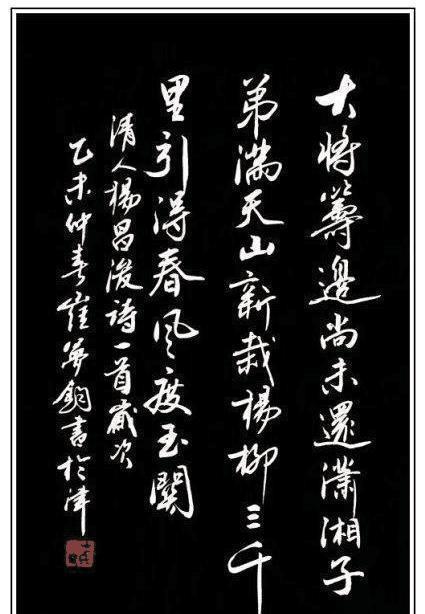National hero Zuo Zongtang carried the coffin into Xinjiang, and although he recovered most of Xinjiang, the Ili region occupied by Tsarist Russia was not completely recovered. According to the Sino-Russian Ili Treaty signed in 1881, China recovered the territory around the Nine Cities of Ili and the Turks River Valley, but still ceded about 70,000 square kilometers of land northeast of Tacheng and west of Ili and Kashgar, of course, this was not the responsibility of Zuo Zongtang, but because of the decaying Qing government.
The general has not yet returned the edge,
Hu Xiang disciples are full of heavenly mountains,
Newly planted willow three thousand miles,
Attracted the spring wind to the jade pass.
This is a poem written by Zuo Zongtang's subordinate Yang Changjun, "Gong Shu Zuo Gong Goes West to Gantang", which depicts the great deeds of Zuo Zongtang in leading the Xiang army to recover the lost land in Xinjiang.

"Recitation of Zuo Gong's Westward Journey to Gantang"
In the first year of the Reign of the Qing Dynasty, a huge revolt broke out in the northwest region, tens of millions of Han people were slaughtered, and under the influence of the Shaanxi-Gansu rebellion, rebellion also occurred in Xinjiang, and the warlord Agubai of the Hao Khanate in Central Asia took advantage of the ruins to invade southern Xinjiang and established the so-called "Zhedesar Khanate" in Xinjiang.
Northwest rebellion
At the same time, taking advantage of the Qing court's self-care and greed for land, Tsarist Russia, which had always been extremely greedy for land, seized the opportunity to forcibly occupy the Ili region of China, calling it "recovery on behalf of the people" in the name of "recovery on behalf of the people." Together with the British, they recognized the so-called puppet regime of Agubai and tried to divide China. China faces the danger of losing a vast territory in Xinjiang.
Zuo Zongtang, one of the four famous ministers of the late Qing Dynasty, was now under orders to quell the Shaanxi-Gansu rebellion, and in 1873, the devastating Shaanxi-Gansu rebellion was finally put down, and Zuo Zongtang, who was already more than 60 years old, immediately led his troops to start a war to recover Xinjiang despite his advanced age.
Coastal defense is divided into defenses
At this time, because the Qing court was unable to take care of itself and the troops were stretched to the limit, the central qing court had a dispute between coastal defense and Cypriot defense. People led by Li Hongzhang advocated coastal defense, but the price of coastal defense was to abandon the defense of Sai, that is, to abandon the frontier, even such as Xinjiang and other huge lands, Li Hongzhang and others also suggested giving up. Zuo Zongtang insisted on attaching equal importance to coastal defense and defense, and he insisted on recovering Xinjiang.
Zuo Zongtang's route to recover Xinjiang
In the first year of the Qing Dynasty, that is, in 1875, Zuo Zongtang was appointed as the Minister of Chincha to supervise the military affairs of Xinjiang. Zuo Zongtang formulated the correct strategic principle of "slowly advancing in a rapid battle, first going north and then going south." After completing the logistical work such as military salaries, military food, and equipment, Zuo Zongtang led a large army to recover Xinjiang, and the army was like a broken bamboo, and soon recovered most of the lost land in Xinjiang, and Agubai soldiers committed suicide in defeat. By January 2, 1878, all of Xinjiang had been recovered except for Ili, which had been occupied by Tsarist Russia.
Unexpectedly, the Qing court was able to recover Xinjiang, and Tsarist Russia began to play tricks, denying that it was unwilling to return the Ili region to China. In 1878, the Qing government sent Chonghou to negotiate with Tsarist Russia on the return of Ili. Cowardly and incompetent, the admiration was forced by the Tsarist government to sign the Treaty of Livadia, which not only lost a large area of Ili territory, but also paid 5 million rubles in reparations, but only nine empty cities.
Zeng Jize
After receiving the news at home, public opinion was very indignant, and under the pressure of public opinion, the Qing court was forced to punish Chonghou and send Zeng Jize to negotiate with Tsarist Russia. Zuo Zongtang, the greatest hero in the recovery of Xinjiang, was even more indignant, and he denounced the lofty traitorous behavior, and began to deploy his army to prepare for the reconquest of Ili by force, despite his nearly seventy-year-old age and illness.
Zuo Zongtang regained Xinjiang
However, the Qing government, which had always been cowardly and incompetent, was not surprisingly instigated again. In order to avoid conflict with Tsarist Russia, the Qing court transferred Zuo Zongtang back to the capital. However, although Zuo Zongtang left Xinjiang, zeng jize's negotiations made new progress in the context of his active preparations for war. In the end, Russia agreed to return the Turks Valley and other places, which is the Sino-Russian Ili Treaty mentioned at the beginning of the article. The Sino-Russian Ili Treaty is still an unequal treaty, but it has made some progress compared to the treaty signed by Chonghou.
This is the sadness of the weak, backwardness will be beaten, without a strong country as the backing, how to work hard heroes can not fully safeguard the interests of the nation. The Ili region was not fully recovered in the end, as is the best example.